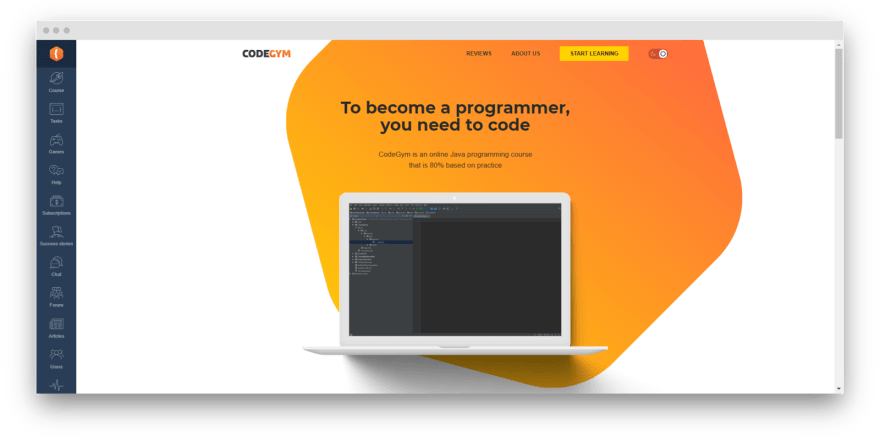The consensus in the programming world is that Java is one of the prime languages for kickstarting your software development career. However, many beginners struggle to find the right platform for learning it. If you’re in these shoes, you’ll be glad to know that this piece was specially prepared for you.
I have carefully curated a list of the top platforms/courses for learning Java based on several years of the learning experience. But before delving into the courses, I’d like to share some programming tips I wish I knew when I began my journey. So, join me as I take you on a ride into the world of learning Java.
How to Make the Java Learning Process Effective
Before I delve into the best platforms for learning Java, I’d like to share some fool-proof tips on how to approach Java learning for beginners.
Create a learning plan and code consistently
It would be best if you viewed learning Java as a journey and not a destination. You cannot possibly master all aspects of Java within a few weeks. But with consistent learning and practice, you can make significant progress within that time frame.
When creating your learning plan, it’s important to set realistic objectives alongside reasonable timelines. List down the aspects of Java you wish to learn and go for a course that aligns with your objectives. Remember not to cram too much within a short time; else, you could become overwhelmed thinking about all the things you have to learn.
Don’t just write code, Read!
Reading code is as integral to learning Java as writing. If you wish to become a great Java programmer, you should develop the habit of reading flawless open-source codes already written by expert developers. First of all I recommend reading from Java Classes. You can do it right from your IDE, let’s say, IntelliJ IDEA. For example, you have a piece of code:
StringBuffer s = new StringBuffer(“my String Buffer is here”);
Place the cursor on StringBuffer, press Ctrl + LMB — and the code of the StringBuffer class written by Java developers will open in a new tab.
Also, you can use GitHub and StackOverflow as your go-to platforms for this purpose.
Checking how experts solve problems greatly increases your versatility as a programmer as you’ll learn multiple ways to solve a single problem. There is a high chance most of your time as a developer will be spent examining already existing codes and figuring out ways to improve them. Starting early gives you a clear advantage.
Network with other learners and developers
If you wish to learn Java faster, you should join a community or several communities of like minds. When you’re in the right community, you’ll have access to knowledge that tutorials may not provide.
You also get to communicate with other budding developers, share your experiences, and gain valuable tips that could aid learning. Importantly, the exploits of fellow learners, as well as other members of your network, can motivate you to be more serious with your learning.
Below are some of the top forums and communities I recommend for beginner developers:
Reddit channels
r/java
r/javahelp
r/programming
r/learnprogramming
r/codetogether
r/programmingtools
r/webdev
Slack communities
Hashtag Developers
European Dev Explorer
Never stop learning
When trying to learn Java or any other programming language for that matter, agility is an invaluable skill. You should strive to always learn new things or new ways of doing old things. I set daily learning targets for my students and it works like magic. Pick up something new every day — a new syntax, a new API, a new design, or architectural pattern, and in no time, you’ll become a pro.
Don’t spend too long on a problem
Even the best programmers get stuck with coding problems from time to time. However, their approach to the problem differentiates them from learners. When you encounter a coding problem or bug, do not spend too long trying to figure it out.
Give yourself a break from time to time or even go ahead with other projects. The more time you spend at a particular point, the less efficient you’ll become. Furthermore, you should always remember that developers’ communities are quite strong, and help is almost always just around the corner. Take advantage of your network and ask questions whenever it appears you’ve hit yet another insurmountable roadblock.
The Best Platforms to Learn Java in 2020
CodeGym
Price: from a free option to $50 per month
Main features
- 80% practice-based
- User-friendly mobile app allows you to learn coding on the go
- Automatic code validation
- Be part of an active network of Java learners
- Well-designed and structured curriculum
- More than 1200 engaging exercises
- Instant grading of completed tasks
- Lectures divided into smaller parts to ease the learning process
- Covers different topics for beginners and intermediate learners
Course Description
CodeGym firmly believes that the only answer to the question “How to learn Java quickly?” is practice, and this is evident in the structure of their Java course. The over 1200 tasks allow learners to practice every principle discussed in the class extensively. Moreover, the assignments are graded instantly to increase the zeal to learn as well as learning speed.
Another exciting feature of CodeGym is that the courses are structured into levels. When you complete a level, you’ll have access to the next. The gamified structure significantly increases learners’ enthusiasm and commitment. Furthermore, there is a mobile app that facilitates learning anywhere and anytime.
2. Java Programming Masterclass for Software Developers
Price: $129.99
Main features
- The instructor uses feedback to improve the course
- Knowledge shared in previous lectures is reviewed before starting a new one
- Teaches the general techniques and tools used by developers to increase productivity
- Around 80 hours of content
- 36 coding exercises
- You get challenges after every topic
- Certificate of completion
- Watch the videos on TV or your smartphone
Course Description
Having garnered almost 500,000 enrollments and an equally impressive number of positive reviews, this masterclass comes with huge popularity and social proof. An Udemy veteran handles the course, and you can trust that learning Java couldn’t be easier.
Beyond the popularity, this video stands out for me because the lecturer has consistently updated the content to accommodate new versions of Java. All the lessons are concise, and the classes are well-organized to aid learning.
3. Java Programming for Complete Beginners in 250 Steps
Price: $179.99
Main features
- A healthy mix of theory + practice + solutions
- Highly recommended for novice learners
- Hundreds of coding assignments
- All the lecture’s code and supporting files have been uploaded to GitHub
- Features a comprehensive troubleshooting guide
Course Description
The 28-minute video covers everything a beginner needs to learn about the most popular programming language. Although brief, the knowledge served provides a solid foundation to build on. I particularly appreciate the fact that it’s a new course, and it dares to deviate from the norm.
The curriculum is based on Java 9, and lessons are structured in a step-by-step manner. The video further features a direct teaching style with the lecturer employing the most recent Java tools to teach the coding.
4. Java Fundamentals by Pluralsight
Price: monthly — $29, annually — $299, premium — $449
**Team and enterprise packages are available as well.
Main features
- Concise lectures on the foundational concept of SOLID
- Chiefly practice-based
- Short and concise
- Interactive lectures and practical assignments
- Thorough explanation of concepts
- Countless examples that border on practicability
Course Description
This lecture is one of my favorites because, unlike most other courses, it doesn’t just help students get the hang of API and syntax. It further focuses on understanding design patterns, a foundation most students miss out on.
From my experience, the most efficient developers are those with a mastery of design patterns. So, it’s no surprise that this excellent Pluralsight course makes my list. The content is short and concise, placing a greater focus on practice ahead of theory.
All the concepts are comprehensively explained, and real-world examples are used to make abstract terms relatable. The pricing structure is also quite flexible, making it easier to learn Java on a budget.
5. Java Certification by Duke University (Coursera)
Price: Free
Main features
- 100% project-oriented, allowing you to build a portfolio while learning
- Graded assignments with peer feedback
- Subdivided into 5 modules that span across the most relevant aspects of Java
- Learn to design algorithms, test, and debug your programs
- Includes a Capstone Project to help you practically apply all that you learn
Course Description
This Duke’s University Java certification goes out of its way to disprove the truism that the best things do not come for free. The course teaches the foundational concepts all Java programmers need to know. Besides, you’ll gain a solid software engineering background as the course covers everything from designing algorithms to testing to debugging programs.
At the end of the program, you should be able to confidently solve real-world problems via programming. Being 100% project-oriented, learners also get to build a portfolio while sharpening their Java skills. This makes it easier to get a job after project completion.
Wrap Up
There you have it! I have shared the best platforms to learn Java, well as some useful tips to make the learning process more effective. Are you already thinking about putting the tips to use? Why not enroll in any of the courses on this list? And as you do, have it in mind that consistency and practice are the keys to becoming a top Java programmer.
First published on JavaRevisited.












Top comments (0)